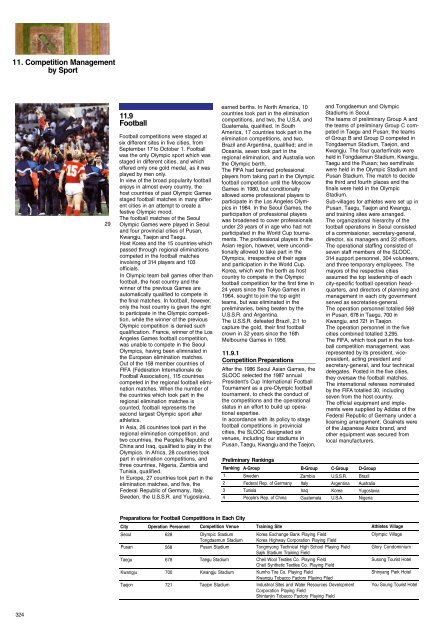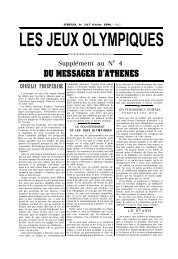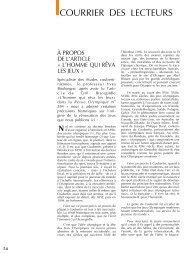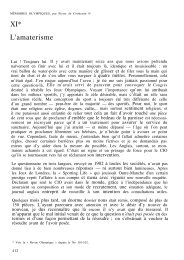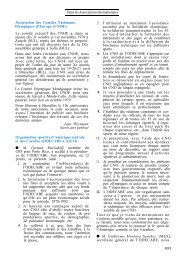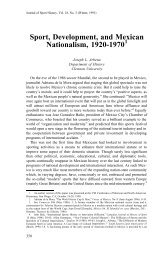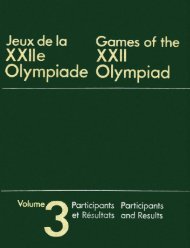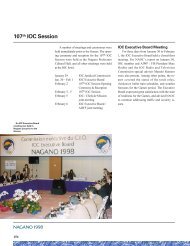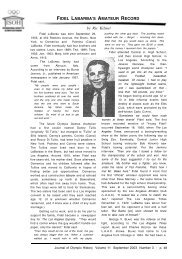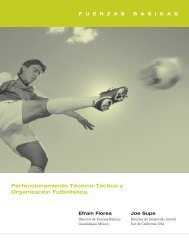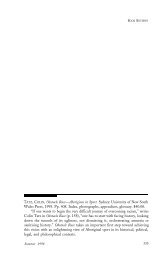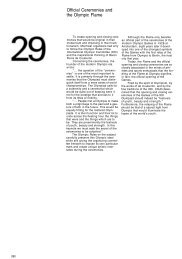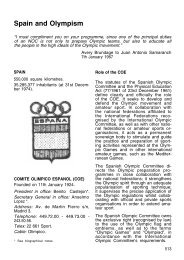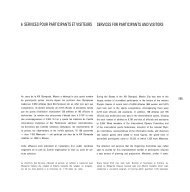Part 2 - LA84 Foundation
Part 2 - LA84 Foundation
Part 2 - LA84 Foundation
Create successful ePaper yourself
Turn your PDF publications into a flip-book with our unique Google optimized e-Paper software.
11. Competition Management<br />
by Sport<br />
324<br />
29<br />
11.9<br />
Football<br />
Football competitions were staged at<br />
six different sites in five cities, from<br />
September 17 to October 1. Football<br />
was the only Olympic sport which was<br />
staged in different cities, and which<br />
offered only one gold medal, as it was<br />
played by men only.<br />
In view of the broad popularity football<br />
enjoys in almost every country, the<br />
host countries of past Olympic Games<br />
staged football matches in many different<br />
cities in an attempt to create a<br />
festive Olympic mood.<br />
The football matches of the Seoul<br />
Olympic Games were played in Seoul<br />
and four provincial cities of Pusan,<br />
Kwangju, Taejon and Taegu.<br />
Host Korea and the 15 countries which<br />
passed through regional eliminations<br />
competed in the football matches<br />
involving of 314 players and 103<br />
officials.<br />
In Olympic team ball games other than<br />
football, the host country and the<br />
winner of the previous Games are<br />
automatically qualified to compete in<br />
the final matches. In football, however,<br />
only the host country is given the right<br />
to participate in the Olympic competition,<br />
while the winner of the previous<br />
Olympic competition is denied such<br />
qualification. France, winner of the Los<br />
Angeles Games football competition,<br />
was unable to compete in the Seoul<br />
Olympics, having been eliminated in<br />
the European elimination matches.<br />
Out of the 158 member countries of<br />
FIFA (Fédération Internationale de<br />
Football Association), 115 countries<br />
competed in the regional football elimination<br />
matches. When the number of<br />
the countries which took part in the<br />
regional elimination matches is<br />
counted, football represents the<br />
second largest Olympic sport after<br />
athletics.<br />
In Asia, 26 countries took part in the<br />
regional elimination competition, and<br />
two countries, the People's Republic of<br />
China and Iraq, qualified to play in the<br />
Olympics. In Africa, 28 countries took<br />
part in elimination competitions, and<br />
three countries, Nigeria, Zambia and<br />
Tunisia, qualified.<br />
In Europe, 27 countries took part in the<br />
elimination matches, and five, the<br />
Federal Republic of Germany, Italy,<br />
Sweden, the U.S.S.R. and Yugoslavia,<br />
earned berths. In North America, 10<br />
countries took part in the elimination<br />
competitions, and two, the U.S.A. and<br />
Guatemala, qualified. In South<br />
America, 17 countries took part in the<br />
elimination competitions, and two,<br />
Brazil and Argentina, qualified; and in<br />
Oceania, seven took part in the<br />
regional elimination, and Australia won<br />
the Olympic berth.<br />
The FIFA had banned professional<br />
players from taking part in the Olympic<br />
football competition until the Moscow<br />
Games in 1980, but conditionally<br />
allowed some professional players to<br />
participate in the Los Angeles Olympics<br />
in 1984. In the Seoul Games, the<br />
participation of professional players<br />
was broadened to cover professionals<br />
under 23 years of in age who had not<br />
participated in the World Cup tournaments.<br />
The professional players in the<br />
Asian region, however, were unconditionally<br />
allowed to take part in the<br />
Olympics, irrespective of their ages<br />
and participation in the World Cup.<br />
Korea, which won the berth as host<br />
country to compete in the Olympic<br />
football competition for the first time in<br />
24 years since the Tokyo Games in<br />
1964, sought to join the top eight<br />
teams, but was eliminated in the<br />
preliminaries, being beaten by the<br />
U.S.S.R. and Argentina.<br />
The U.S.S.R. defeated Brazil, 2:1 to<br />
capture the gold, their first football<br />
crown in 32 years since the 16th<br />
Melbourne Games in 1956.<br />
Ranking<br />
Preparations for Football Competitions in Each City<br />
City<br />
Seoul<br />
Pusan<br />
Taegu<br />
Kwangju<br />
Taejon<br />
Operation Personnel<br />
628<br />
568<br />
678<br />
700<br />
721<br />
1<br />
2<br />
3<br />
4<br />
Competition Venue<br />
Olympic Stadium<br />
Tongdaemun Stadium<br />
Pusan Stadium<br />
Taegu Stadium<br />
Kwangju Stadium<br />
Taejon Stadium<br />
11.9.1<br />
Competition Preparations<br />
—————————————–<br />
After the 1986 Seoul Asian Games, the<br />
SLOOC selected the 1987 annual<br />
President's Cup International Football<br />
Tournament as a pre-Olympic football<br />
tournament, to check the conduct of<br />
the competitions and the operational<br />
status in an effort to build up operational<br />
expertise.<br />
In accordance with its policy to stage<br />
football competitions in provincial<br />
cities, the SLOOC designated six<br />
venues, including four stadiums in<br />
Pusan, Taegu, Kwangju and the Taejon,<br />
Preliminary Rankings<br />
A-Group<br />
Sweden<br />
Federal Rep. of Germany<br />
Tunisia<br />
People's Rep. of China<br />
Training Site<br />
B-Group<br />
Zambia<br />
Italy<br />
Iraq<br />
Guatemala<br />
and Tongdaemun and Olympic<br />
Stadiums in Seoul.<br />
The teams of preliminary Group A and<br />
the teams of preliminary Group C competed<br />
in Taegu and Pusan; the teams<br />
of Group B and Group D competed in<br />
Tongdaemun Stadium, Taejon, and<br />
Kwangju. The four quarterfinals were<br />
held in Tongdaemun Stadium, Kwangju,<br />
Taegu and the Pusan; two semifinals<br />
were held in the Olympic Stadium and<br />
Pusan Stadium. The match to decide<br />
the third and fourth places and the<br />
finals were held in the Olympic<br />
Stadium.<br />
Sub-villages for athletes were set up in<br />
Pusan, Taegu, Taejon and Kwangju,<br />
and training sites were arranged.<br />
The organizational hierarchy of the<br />
football operations in Seoul consisted<br />
of a commissioner, secretary-general,<br />
director, six managers and 22 officers.<br />
The operational staffing consisted of<br />
seven staff members of the SLOOC,<br />
314 support personnel, 304 volunteers,<br />
and three temporary employees. The<br />
mayors of the respective cities<br />
assumed the top leadership of each<br />
city-specific football operation headquarters,<br />
and directors of planning and<br />
management in each city government<br />
served as secretaries-general.<br />
The operation personnel totalled 568<br />
in Pusan, 678 in Taegu, 700 in<br />
Kwangju, and 721 in Taejon.<br />
The operation personnel in the five<br />
cities combined totalled 3,295.<br />
The FIFA, which took part in the football<br />
competition management, was<br />
represented by its president, vicepresident,<br />
acting president and<br />
secretary-general, and four technical<br />
delegates. Posted in the five cities,<br />
they oversaw the football matches.<br />
The international referees nominated<br />
by the FIFA totalled 30, including<br />
seven from the host country.<br />
The official equipment and implements<br />
were supplied by Adidas of the<br />
Federal Republic of Germany under a<br />
licensing arrangement. Goalnets were<br />
of the Japanese Asics brand, and<br />
other equipment was secured from<br />
local manufacturers.<br />
C-Group<br />
U.S.S.R.<br />
Argentina<br />
Korea<br />
U.S.A.<br />
Korea Exchange Bank Playing Field<br />
Korea Highway Corporation Playing Field<br />
Tongmyong Technical High School Playing Field<br />
Sajik Stadium Training Field<br />
Cheil Wool Textiles Co. Playing Field<br />
Cheil Synthetic Textiles Co. Playing Field<br />
Kumho Tire Co. Playing Field<br />
Kwangju Tobacco Factory Playing Filed<br />
Industrial Sites and Water Resources Development<br />
Corporation Playing Field<br />
Shintanjin Tobacco Factory Playing Field<br />
D-Group<br />
Brazil<br />
Australia<br />
Yugoslavia<br />
Nigeria<br />
Athletes Village<br />
Olympic Village<br />
Glory Condominium<br />
Susong Tourist Hotel<br />
Shinyang Park Hotel<br />
You Soung Tourist Hotel


